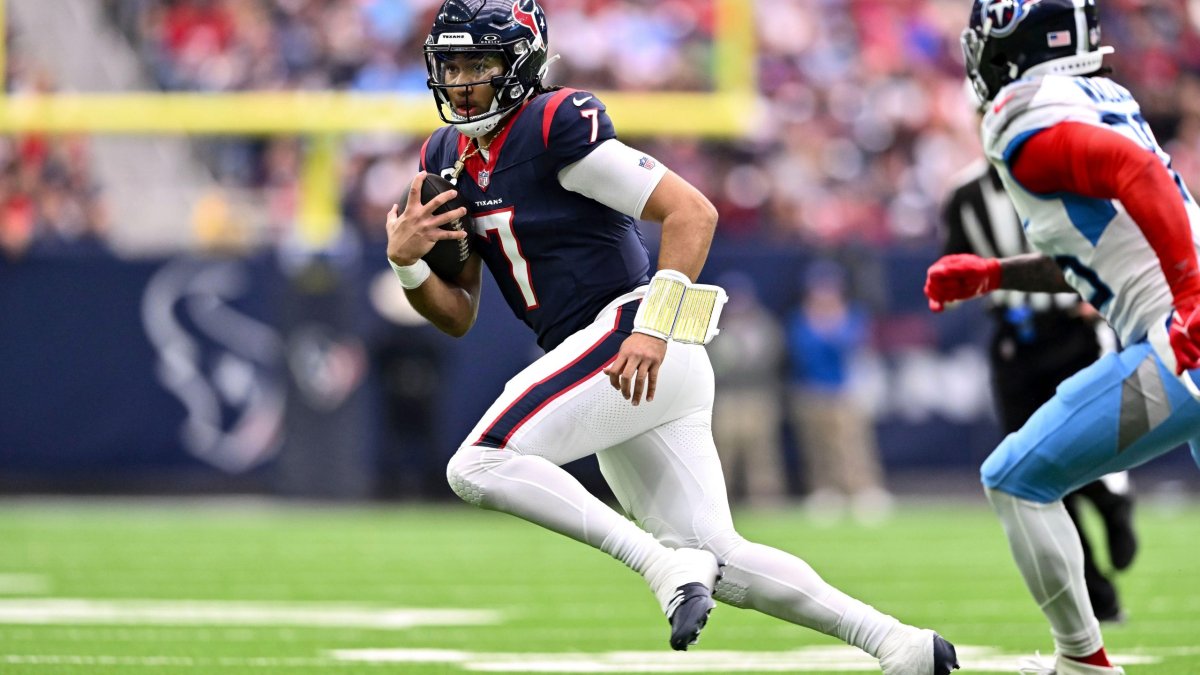• Houston Texans draft class shines: The Texans received tremendous contributions from three of their top four picks on the way to a division title and the biggest turnaround in the NFL. C.J. Stroud and Tank Dell immediately formed a dynamic rapport on offense while Will Anderson Jr. lived up to his billing as the first defensive player drafted.
• Jalen Carter dominates for the Philadelphia Eagles: Carter showed why some thought he was the most talented player in the 2023 class with a record-setting performance. He established himself as one of the league's best defensive tackles in year one.
• Looking for more grades and data? To access PFF Premium Stats, subscribe now!
Estimated reading time: 9 minutes
The 2023 draft class featured some surprise contributors, record-breaking performances and a loaded running back class. We’ll dive into every position and identify some of the standouts who made a significant impact on their team.
QB C.J. Stroud, Houston Texans
No surprise here with Stroud. He was fantastic all season and led the Texans to a seven-win improvement and an AFC South title. He excelled throwing downfield and came through for Houston in the biggest moments of their season.
Stroud’s 82.8 overall PFF grade is the 14th-best in football while his 98.6 deep passing grade ranks second behind Brock Purdy.
RB Devon Achane, Miami Dolphins
This may be the toughest choice on this list considering other stud candidates such as Bijan Robinson and Jahmyr Gibbs. Achane’s efficiency, though, is too tough to ignore.
Achane leads all players with a 93.5 PFF rushing grade and laps the field with 7.9 yards per carry. His eight rushing touchdowns rank second among rookies behind Gibbs despite receiving 80 fewer carries. Achane may have led the league in rushing had he not dealt with injuries early in the season.
WR Puka Nacua, Los Angeles Rams
Nacua established himself as the biggest steal in the 2023 class, breaking the rookie reception and receiving yardage records. Nakua’s 1,486 receiving yards are fourth-most in the NFL while his 85.1 PFF receiving grade is tied for 12th.
Nacua is one of six receivers who posted a 99.9 deep receiving grade this season, and he led that group with five contested catches on such targets.

WR Rashee Rice, Kansas City Chiefs
It took a while for the Chiefs to feature Rice, but he excelled when given the opportunity. Rice’s 85.1 PFF receiving grade is tied with Puka Nacua for 12th-best in the NFL.
Rice excels with the ball in his hands. His 8.3 yards after catch per reception ranks second among qualified receivers behind Deebo Samuel. As a result, Rice carries a 2.39 yards per route run figure that is 10th-best in the league. That level of efficiency with Patrick Mahomes throwing to him could put him in line for a huge 2024.
WR Tank Dell, Houston Texans
Dell proved himself as an explosive playmaker before suffering a season-ending leg injury. The combination of him and Nico Collins gave C.J. Stroud an excellent pair of downfield weapons to work with.
Dell finishes the regular season with the 15th-best receiving grade in the NFL. His 92.6 PFF receiving grade on 10-plus yard throws is second-best among rookie receivers behind Puka Nacua (92.8).
TE Sam LaPorta, Detroit Lions
LaPorta was a revelation for the Lions this year as he set the rookie tight end record with 82 receptions. His 10 touchdowns led all tight ends and his 81.0 receiving grade was fourth-best behind George Kittle, Travis Kelce, and T.J. Hockenson.
Jared Goff had no problem trusting LaPorta in tight spots. LaPorta led all tight ends with 13 contested catches during the regular season. He’s well on his way to being an elite tight end.
LT Wanya Morris, Kansas City Chiefs
Amazingly, only two rookies played at least 150 snaps at left tackle this season, Wanya Morris and Jaelyn Duncan. Between those two, Morris graded far higher, albeit with an unimpressive 54.6.
Morris has seen significant action in the Chiefs’ last six games. He posted at least a 73.4 PFF pass-blocking grade in three of those games.
LG Peter Skoronski, Tennessee Titans
Skoronski’s transition to guard certainly had some hiccups, including early-season injuries, but he showed enough in pass protection to be considered a foundational piece for Tennessee's offensive line.
Among Skoronski’s highlights are two consecutive games, in Week 11 and 12, in which he posted an 85-plus PFF pass-blocking grade. He also committed just one penalty all season.
C Joe Tippmann, New York Jets
Tippmann made his first four starts at guard before getting injured and returning to play center in Week 9. As a center, he posted a 61.9 PFF overall grade.
Tippmann improved down the stretch and finished the season as the Jets’ highest-graded offensive lineman who played at least 300 snaps. His spot may currently be the only one that is solidified going into next season.
RG Sidy Sow, New England Patriots
Sow, a fourth-rounder from Eastern Michigan, gave New England a lot of solid reps, especially in the run game. His 71.2 PFF run-blocking grade led all rookie linemen by a wide margin.
Where Sow excelled was in gap schemes. His 80.8 PFF gap scheme run-blocking grade ranked third-best among all qualified guards. He needs work in pass protection, but finding a player like Sow in the fourth round was a nice addition to the Patriots’ roster.
RT Dawand Jones, Cleveland Browns
The 6-foot-8, 375-pound Jones wasn’t supposed to be such an important piece this season, but Jack Conklin’s season-ending injury pushed him into a starting role. Jones responded by posting 64.7 overall and 73.0 PFF pass-blocking grades that led all rookie offensive linemen.
Unfortunately, Jones suffered a season-ending injury in practice before Week 14. Many of the big-name linemen in the 2023 class ended up playing right tackle this season, but when he played, Jones was better than all of them.
DI Jalen Carter, Philadelphia Eagles
Carter’s rookie season was simply phenomenal. His 89.0 overall PFF grade ranked fifth-best among qualified defensive tackles. Outside of one poor performance in Dallas, he’s been Philadelphia’s best player this season.

Carter’s pass-rush ability is his calling card. He generated 49 pressures and his 85.9 PFF pass-rush grade is the best by a rookie defensive tackle in PFF history.
DI Kobie Turner, Los Angeles Rams
Turner quietly almost matched Carter’s production as Aaron Donald’s sidekick in Los Angeles. His 83.8 overall PFF grade ties him for ninth-best among qualified defensive tackles, and he finished the regular season with 48 pressures, one less than Carter.
Tuner isn’t just a pass-rusher, though. He’s one of just three qualified defensive rookies who posted 70-plus grades in the pass rush and run defense.
EDGE Will Anderson Jr., Houston Texans
The first defensive player taken in the 2023 draft lived up to his billing. He led all rookies with 59 pressures and posted identical 77.3 PFF pass-rush and run-defense grades. His 81.8 overall PFF grade leads all qualified rookie edge defenders by more than ten points.
C.J. Stroud and the offense get most of the publicity, but Anderson is a major reason the Texans jumped from 31st in defensive grade last year to 11th this season.
EDGE Tuli Tuipulotu, Los Angeles Chargers
Tuipulotu was an outstanding run defender for Los Angeles. His 88.4 PFF run-defense grade not only led all rookies but trailed only Maxx Crosby, DeMarcus Lawrence, and Khalil Mack among qualified edge defenders.
He also finished second behind Anderson with 51 pressures. Tuipulotu was an excellent addition to a team that is perpetually trying to fix their defense.
LB Ivan Pace Jr., Minnesota Vikings
One of two undrafted players on this list, Pace has been the perfect fit for Brian Flores’ defense in Minnesota. His 77.2 overall PFF grade leads all qualified rookie linebackers and ranks 17th in the league.
Pace’s trademark blitzing ability has carried over from his days at the University of Cincinnati. His 22.9% pass-rush win rate is the second highest among 85 linebackers with at least 20 pass-rush snaps this season.

LB Jack Campbell, Detroit Lions
Campbell has been a stabilizing force in Detroit’s run defense. His 75.9 PFF run defense grade leads all Lions linebackers and ranks 21st in the NFL. He’s gotten a better feel for attacking downhill and has established himself as the mike linebacker in Detroit’s defense.
He’s struggled in coverage so far, but he was excellent in that facet in college. If his coverage skills catch up to his production in the run game, he could turn himself into an excellent player.
CB Devon Witherspoon, Seattle Seahawks
Witherspoon was used outside and in the slot and turned in a Rookie-of-the-Year-worthy campaign. His 84.1 overall PFF grade was 4th-best in the NFL among qualified cornerbacks.
Witherspoon’s versatility became his calling card. He finished the season with 10 pressures, three sacks, an interception, 10 pass breakups, and an 80.0 PFF run-defense grade. He and Antoine Winfield Jr. are the only defensive backs in the NFL to finish the regular season with a PFF grade of at least 79.0 in run defense, coverage and rushing the passer.
CB Mekhi Blackmon, Minnesota Vikings
Blackmon finished third among rookie cornerbacks in overall and PFF coverage grade at 71.7. He is also the only rookie to play 400 snaps and not miss a tackle. That reliability has been a key asset in Minnesota’s rebuilt secondary.
Blackmon also proved to be a ballhawk, leading his team with eight pass breakups despite playing just the seventh-most coverage snaps.
Slot CB: Brian Branch, Detroit Lions
Branch has been terrific manning the slot for the Lions. He leads the team with 11 pass breakups while his 83.6 PFF run defense grade is eighth-best among qualified cornerbacks.
Branch may be rounding into form just in time for the postseason as well. He’s posted a 70-plus grade in three consecutive games to end the regular season. That’s the first time he’s accomplished that this year.
S Jordan Battle, Cincinnati Bengals
Battle ranks second among rookie safeties with 524 snaps played and an 82.5 overall PFF grade. The latter figure is a top-10 mark in the NFL and leads all Bengals defenders regardless of position.
Battle is one of five NFL safeties with a 75-plus PFF grade in run defense and coverage (Antoine Winfield Jr., Jabrill Peppers, Jessie Bates III and Jevon Holland).
S Ronnie Hickman Jr., Cleveland Browns
The undrafted Hickman played just 308 snaps and didn’t see significant action until Week 14, but he was spectacular when he got his chance. His 86.5 overall grade is sixth-best among qualified safeties.
Hickman makes his hay in coverage. He’s allowed four receptions for a total of six yards across 221 coverage snaps while also reeling in an interception and breaking up two passes.




 © 2025 PFF - all rights reserved.
© 2025 PFF - all rights reserved.